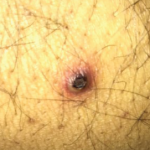Also similar to modern rheumatic care is the way in which gastroenterologists seek to use a treat-to-target approach, with a combination of laboratory, imaging, histologic and patient-reported outcome measures. Some unique considerations in IBD management are: 1) symptoms do not always correlate with bowel inflammation, 2) anxiety and depression are increased in patients with IBD, 3) surgery is effective, but disease can recur after these interventions, and 4) enteric protein loss can affect the clearance of monoclonal antibodies when they are used for treatment.
Treatment
Several comparative effectiveness studies indicate combined treatment with anti-tumor necrosis factor (TNF) therapy and other immunomodulatory medications may be superior to anti-TNF therapy alone in patients with IBD. In the SONIC trial, more than 500 adults with moderate to severe Crohn’s disease were randomized to receive infliximab monotherapy, azathioprine monotherapy or combination treatment with both medications. At week 26 of follow-up, 57% of patients in the combination group achieved steroid-free remission vs. 44% in the infliximab monotherapy group and 30% in the azathioprine monotherapy group.4 Similar results favoring combination therapy with infliximab and azathioprine were seen in the UC SUCCESS trial.5
Several anti-integrin treatments, namely natalizumab and vedolizumab, have become part of the treatment armamentarium for IBD. These medications show promise in helping prevent or reduce severity of arthritis and arthralgias in many patients with IBD. In a post hoc analysis of data from the GEMINI studies—the phase 3 trials evaluating vedolizumab for the treatment of ulcerative colitis and Crohn’s disease—vedolizumab was significantly less likely than placebo to be associated with new or worsening arthritis or arthralgias in patients with Crohn’s disease.6
Janus kinase (JAK) inhibitors have also started to gain attention as potential treatments for the gastrointestinal and arthritic complications of IBD. A unique dose of the JAK inhibitor tofacitinib has been used to treat patients with ulcerative colitis, with an induction regimen of 10 mg orally twice per day for eight weeks, followed by a maintenance dose of 5 mg twice per day, which can be increased to 10 mg twice per day if needed. Because JAK inhibitors have quickly become a treatment of choice for many patients with RA, these medications may also become potential options to target the joint and gut manifestations of IBD.
In the final portion of the talk, Dr. Rubin discussed the importance and use of trough levels—the lowest concentration reached by a drug before the next dose is administered and the level frequently used for therapeutic monitoring. He noted that trough levels of medications used in the treatment of IBD correlate well with clinical response. In other words, higher trough levels of a medication are associated with improved control of IBD in patients, and consistently lower trough levels are associated with worse control.

